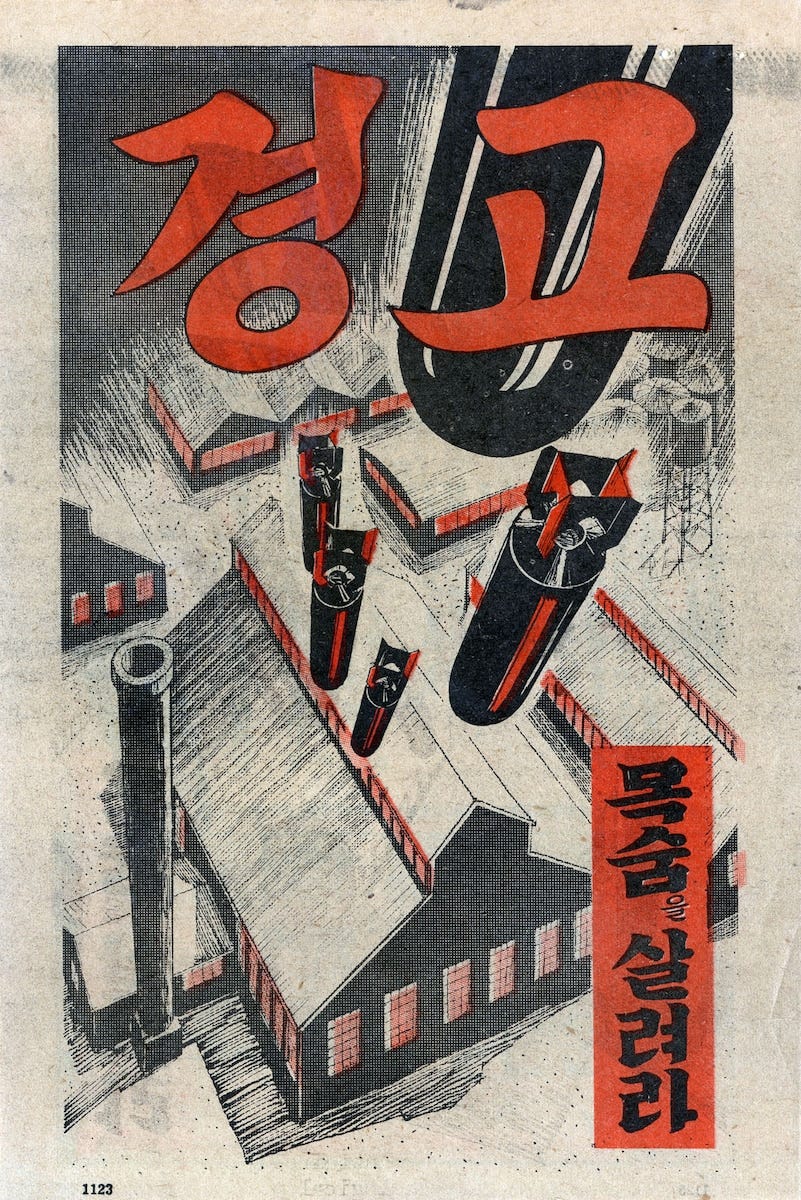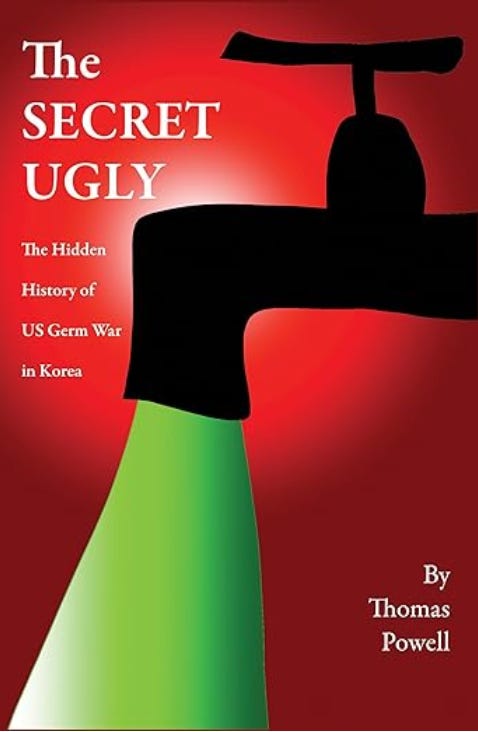Tom Powell’s Powerful Jolt of Truth on the Korean War
The son of famed journalist John W. Powell has written both a memoir & a history, revisiting the U.S. persecution of his parents, who reported on American use of biological weapons in the Korean War
As a matter of full disclosure, I have to say it is a most peculiar thing to write a review of a book that includes laudatory references to your own work. But certainly not more peculiar and strange than the subject matter of Thomas Powell’s new book, The Secret Ugly: The Hidden History of U.S. Germ War in Korea.
The book is an amazing revisionist history of the U.S. experimental campaign of biological warfare during the Korean War. Indeed, what could be more bizarre than a covert U.S. program costing billions of dollars – the second most costly covert weapons program in the history of the United States, after the Manhattan Project’s building of an atomic bomb – and aimed to produce weapons that could deliver both incapacitating and fatal illnesses to potentially sicken millions of people?
Tom Powell did not come by this topic serendipitously. His father, John W. (Bill) Powell reported on this story from China in the early 1950s. Both Tom’s father and his mother, Sylvia, were charged with sedition in 1956 for reporting this story, upending the Powell’s domestic and professional lives. While the charges were ultimately dismissed in 1961 after their first prosecution had ended in a mistrial, Bill Powell persevered and ended up producing a landmark report in the early 1980s showing that the U.S. had made a deal with Imperial Japan’s biowarfare department, Unit 731.
I am heartsick, and I take no pleasure in bearing this awful news. I have not put my life on hold these past six years to research and write this book just to vindicate my parents. I wrote this book because I am a patriot”
Powell's revelations of a trade of biological warfare data from inhuman experiments for 731's amnesty from war crimes received a lot of press. The publicity was a vindication for Bill, and his son, Tom, retells this frightening story of government repression from the vantage point of a personal participant.
After Bill Powell’s revelations, the issue of germ warfare and the U.S. role in researching and using such a dire weapon of mass destruction faded away in the West for a number of years. The subject was resurrected in 1998, when two Canadian historians, Stephen Endicott and Edward Hagerman, wrote an academic book that argued persuasively that the old Korean War-era charges of the U.S. using bacteriological weapons was true. That same year, two Cold War academics released a couple of essays, along with translations of a dozen ostensibly Russian documents from 1953 that supposedly revealed the old germ war charges were an elaborate “hoax.”
This is the germ for Tom Powell’s book. The “secret ugly” truth is that the U.S. did use biological weapons (BW). As Tom explains, the “smoking gun” for that allegation was the CIA’s 2010 declassification of former top secret communications intelligence reports that quoted radio intercepts of coded Communist communications. Those communications included North Korean and Chinese military units reporting on the circumstances of the BW attacks, the need for vaccines, the outcomes of occasional false reports, and more. (Powell cites my work on the subject, hence the “full disclosure.”)
The resulting book is a compendium of subjects pertaining to the seventy-year-old controversy, including a critical look at the works of proponents of the BW “hoax” point of view. The narrative moves back and forth from Tom’s memories of growing up in Bill and Sylvia’s household; the period of government persecution that slammed his family; Tom’s move to New Mexico and finding his identity as an artist; along with other elements of personal memoir, and Tom’s historical narrative on the development of the U.S. biowar program, the decision to use BW, and the prodigious amount of evidence available to document U.S. use.

Powell is an accomplished scholar. His essays on the subject have been published in the peer-reviewed journal, Socialism and Democracy. In the book, Tom covers a number of well-known aspects to this truly remarkable scandal. The importance of the amnesty and recruitment of Japan’s Unit 731 personnel; the unique role of General MacArthur’s medical official, General Crawford Sams; the two international Truth Commissions that investigated the claims of germ warfare; the confessions of 25 U.S. airmen to participation in the BW bombing campaign; the lurid tales of Communist “brainwashing,” etc.
Powell also covers most of the various literature produced to both debunk and also support the germ warfare charges. There has been no shortage of debunkers or “hoax” proponents who have tackled the subject matter of the germ warfare charges and pronounced the U.S. government innocent of such a heinous crime. Simply to have summarized the arguments of these critics and provided a critique of their work is impressive enough, but Tom’s analysis of Cold War scholar Milton Leitenberg’s work on the subject is especially important.
Along with a single 1998 essay by Kathyrn Weathersby, who translated twelve purported Soviet archival documents that supposedly exposed for all time the Soviet-engendered myth of U.S. BW attack, Leitenberg’s work on the subject over the last twenty-five years has been seen by Establishment historians and journalists as the final word on the supposed Soviet-Chinese-North Korean germ warfare deception. His last major work on the subject was published in 2016. This is not the time and place to restate all the arguments against Leitenberg’s “hoax” project, though I have written on the subject more than once myself – here and here, for instance.
Unlike my own analysis of the Leitenberg-Weathersby Soviet documents, Powell doesn’t just rely on textual analysis, as I do. He correctly sees deeper systemic issues at play in the BW “hoax” denialist canon. A somewhat extended quote captures Tom’s some of his important critique, namely the implicit racism of the “hoax” arguments, and the demonization of China as an enemy “other.”
Writing of how Leitenberg’s work “follows the well-worn path of US denial and dismissal begun by Secretary of State Dean Acheson,” Powell writes:
Leitenberg’s denialism attempts a higher level of subtlety than earlier smear jobs, but continues the same motif. For example, he gives us descriptive summaries of the two Western investigative committees who visited North Korea and China – the IADL panel of jurists and the ISC panel of scientists. Like previous deniers Leitenberg ignores the specifics of the two committee findings which included lab reports, autopsies, physical evidence collected at the sites, and eye-witness testimony. This data he disparages wholesale as tainted because its collection was performed by the Chinese scientists. This is American racialism always in the background. The implication is that the Chinese are our enemies in this war so of course they would deviously attempt to alter the data to make their false propaganda claim. (pp. 249-50)
As one can see, Tom is quite open about his partisanship on this subject, quite rightly rejecting the idea of so-called “objective” history. That doesn’t mean that he rejects facts. The book is impeccably documented. What Powell means is that he cares, and he isn’t afraid to say what this topic evokes in him. The clear point-of-view allows the reader to check for the effects of bias as he or she wishes.
Early on in the book, Tom states, “Biological warfare presents humanity at its worst. All who profit in some regard from the potential destruction of fellow human beings are at the very least deluded” (pg. 20).
Part way through the book, Tom relates how his immersion in this dark subject led him to have night terrors. He recognizes how his parents’ love for each other, and their political engagement saved them from despair in the dark days of government attack. Additionally, Bill had other satisfactions and talents, from family outings to a talent for real estate investment and house remodeling.
Sylvia Powell had many talents, too. From Tom’s account, she kept the family together, and her impressive social skills helped the family keep and expand their social supports during the turmoil of the couple’s prosecution. She had learned many of these skills years earlier as a private secretary for Madame Sun Yat-sen. The Powell family was well-connected, but those connections weren’t merely serendipitous, but nurtured via Sylvia’s charms and social graciousness.
Tom, too, has his personal supports, not least his wife. The importance of personal relationships as an anodyne from the potentially destructive blowback of political action emerges as an important subtext to the drama of the Powell’s family history.
Tom also is quite clear about why he wrote this book, a book that should be a best-seller, and I hope one day will be. On revealing the many facts related to the U.S. germ war campaign and its cover-up, Tom states:
“It is a terrible truth to publicly reveal. The facts have been laid there; there is mountainous evidence beyond any reasonable doubt. I am heartsick, and I take no pleasure in bearing this awful news. I have not put my life on hold these past six years to research and write this book just to vindicate my parents. I wrote this book because I am a patriot. I love my country, but I am terrified by its leaders who warmonger across the planet at will on behalf of a small handful of ultra-wealthy war profiteers.” (p. 296-97).
Tom Powell has written the most important book on the germ warfare controversy during the Korean War since Stephen Endicott and Edward Hagerman published their 1998 book, The U.S. and Biological Warfare: Secrets from the Early Cold War and Korea. In doing so, he no doubt had to face a lot of personal demons, and reengage with a story of family trauma that most people would probably rather leave untouched and forgotten.
It’s not an accident, as Tom points out in his book, that the Korean War is also known as the “forgotten war.” But we as a society don’t have the luxury to forget forever. Like Freud’s great Return of the Repressed, the memories thought lost to time are still there. Their historical vestiges have not been all wiped out. The meaning of having perpetrated not just the crime, but the giant cover-up of this crime for decades hangs over our society now, what with the urgency of possible world war that could easily break out first on the Korean peninsula.
Tom Powell has shown courage and perspicacity. His book is a wonder, like the man. There are few books in your life that you will buy that are more important than this one.
Note: Portions of this article were initially published in an Amazon book review, “Part Memoir, part History, Powell’s Powerful Jolt of Truth on the Korean War”





